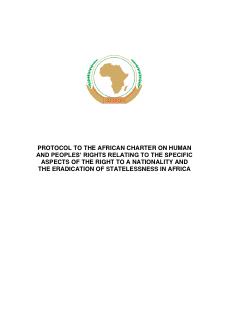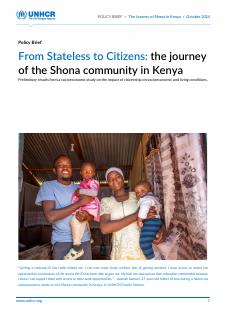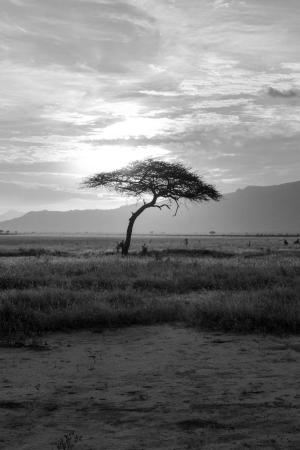“God saw that my parents came here. I was born here. They died and left me here. I was married here. I had children and my children had children. If people say I'm not from here, what can I say?”
Aminata, Côte d’Ivoire
KEY MESSAGES
- Statelessness is a significant but poorly documented problem in Africa. The number of stateless people is especially difficult to quantify in Africa because many people have historically held no official identity documents and birth registration rates have been low.
- State succession, both the legacy of decolonisation and more recent succession situations, leading to the (re)drawing of borders and (re)definition of national belonging are a major cause of statelessness in Africa.
- Of the 24 States that still discriminate against women in their ability to transmit nationality to their children, five are Africa; but the three most recent legislative reforms to address gender inequality were also in Africa (Liberia in 2022, Madagascar and Sierra Leone in 2017).
- Most African States do not have safeguards guaranteeing nationality to children born in their territory who would otherwise be stateless, with the result that children continue to be born stateless across Africa.
- Accessions to the 1954 and 1961 Statelessness Conventions have been climbing in Africa in recent years, complementing an evolving regional human rights framework and the introduction of a number of new sub-regional agreements and initiatives relating to statelessness and the right to nationality.
STATELESSNESS IN AFRICA
Statelessness is a significant but poorly documented problem in Africa. Of the 48 countries in Sub-Saharan Africa, just five reported data on the number of stateless persons in the country in the global statistical reporting published by UNHCR in June 2023 (Burundi, Cabo Verde, Cote D'Ivoire, Rwanda, and Uganda). UNHCR has provided an estimate for Kenya and a preliminary estimate for South Sudan. A further seven countries - Democratic Republic of the Congo, Eritrea, Ethiopia, Liberia, Madagascar, South Africa, and Zimbabwe - were marked with an asterisk, denoting that UNHCR has information about stateless persons but no reliable data.
Africa shares the common challenges in ascertaining an accurate picture of the scale of statelessness anywhere in the world, but the number of stateless people is especially difficult to quantify in Africa because very many people have historically held no official identity documents and birth registration rates have been very low. The stateless population overlaps with a larger population without documents recognising nationality whose nationality status may be unclear until put to the test through efforts to acquire documentation.
Despite a lack of the data on the numbers of those stateless in Africa, the main root causes of statelessness are nonetheless known. They include the frequently contested nationality status of ethnic groups whose pre-colonial territory is divided by colonial borders or who migrated or were forcibly moved during the colonial period, and the discriminatory laws and practices that continue this exclusion. Around half of African states provide for no rights to nationality based on birth in the territory, including when children cannot acquire nationality from a parent.
STATE SUCCESSION AND DECOLONISATION
State succession, both the legacy of decolonisation and more recent succession situations, leading to the (re)drawing of borders and (re)definition of national belonging are a major cause of statelessness in Africa – especially for minority groups and the descendants of historic migrants who arrived pre-independence. Such groups include both those who had their origins outside Africa, such as the “Lebanese” of West Africa and the “Asians” of East Africa; as well as those from within the same state territory, such as the Banyarwanda, a group of which some of the same ethnicity had always lived in the territory that is now the Democratic Republic of the Congo, but others had been moved to the east of the state by Belgium and who are now seen to be foreigners.
Nearly every country in Africa has pre-existing communities or polities that have been bisected by modern territorial borders. Nomadic and cross-border populations have been among those affected in this context and continue to face practical and political challenges to acquisition or recognition of nationality today because relevant laws and procedures are not designed to accommodate them. Recent situations of state succession that that have caused statelessness include the secession of Eritrea from Ethiopia in 1993, the transfer of the Bakassi peninsula between Nigeria and Cameroon following the judgment of the international Court of Justice in 2002, and the secession of South Sudan from Sudan in 2011.
GENDER AND RACIAL DISCRIMINATION
Of the 24 States that still discriminate against women in their ability to transmit nationality to their children, five are in sub-Saharan Africa: Burundi, Somalia, Sudan, eSwatini, and Togo. However, the three most recent legislative reforms to address gender inequality were in also Africa (Liberia in 2022, Madagascar and Sierra Leone in 2017). The constitutions of Burundi and Sudan contain provisions guaranteeing gender equality in transmission of nationality to children, while Togo’s Children’s Act also provides for equal rights, yet in practice discriminatory nationality laws often take precedence despite constitutional guarantees of equality. Liberia and Eswatini both included pledges to remove gender discrimination from their nationality laws by 2024 as part of the 2019 UNHCR High-Level Segment on Statelessness. While Liberia has already reformed its law, Eswatini is yet to do so.
Racial, religious, and ethnic discrimination are also present in the nationality laws of several African states and result in individuals being unable to acquire nationality. Seven African states have nationality laws with explicit provisions that discriminate based on race or ethnicity in attribution of citizenship at birth. Some others have preferential terms for acquisition of nationality by naturalisation. In Liberia only those of “Negro descent” can be citizens either through birth or nationalisation, a Constitutional provision which has been subject to criticism by the Committee on the Rights of the Child. Sierra Leone has a similar provision but does allow non-“negro-Africans” to acquire citizenship by naturalisation. The Ugandan constitution establishes a list of ethnic groups of which a person must be a member to be a citizen by birth; and DRC, Nigeria, and South Sudan refer generally to indigenous communities established on the territory. Somalia provides for citizenship to be attributed to “any person who by origin, language or tradition belongs to the Somali Nation”.
CHILDHOOD STATELESSNESS
Most African States do not have safeguards guaranteeing nationality to children born in their territory who would otherwise be stateless, with the result that children continue to be born stateless across Africa – whether in the context of discriminatory laws, conflicts of law situations or the intergenerational perpetuation of statelessness. No African state both has in law and respects in practice a right to nationality based purely on birth in the territory. Around half of African states, however, either attribute nationality automatically to the second generation born in the country (the rule of double jus soli) or permit a person born in the country to acquire nationality if still resident there at majority. Double jus soli, in particular, prevents multigenerational statelessness in those states where it is in force (mainly West Africa).
Statelessness has also resulted in Africa from the low levels of birth registration, as well as lack of due process and the broad discretion granted to State officials responsible for the issuing of identity cards, which in practice determine an individual’s access to proof of nationality. While birth registration does not equate to nationality, it can provide the strongest opportunity for ensuring that a child can claim their legal entitlement to nationality. In some countries, such as Burundi, birth certificates are legal proof of nationality, whereas in other countries birth certificates are used as evidence of citizenship in practice even where there is no legal basis to do so. A 2022 joint UN Economic Commission for Africa and UNICEF report indicated that of the estimated 164 million unregistered children in the world, more than half, around 91 million, are in Africa. Although there is significant variation between countries and regions within the continent, this figure equates to nearly half of all African children under five years old.
Lack of access to birth registration can particularly heighten the risk of statelessness for children on the move. Migrants, especially migrants without a regular immigration status, can struggle to maintain their connection with their country of origin, especially because of difficulties in accessing consular assistance for issue or legalisation of civil status certificates. Long term-refugees and former refugees face similar difficulties. If it is not possible to acquire nationality in the country of residence these challenges generate statelessness, particularly in subsequent generations born outside the parents’ country.
DOCUMENTATION PRACTICES AND DIGITAL ID
While a majority of African states have had in place a requirement for national identity cards since soon after independence, some have not done so until recently. Across the region, new national identification systems are now being introduced. The introduction of new biometric technologies and digital identity systems in Africa has been heralded as a solution to the documentation “gap”, but if the underlying legislative and policy structures that determine access to citizenship are not addressed, this change may increase rather than decrease the incidence of statelessness.
The increasing use of digital identification systems has been listed as a goal of the Economic Commission for Africa. However, states such as Tanzania and Uganda have shown the potential for new identity systems to exclude those who do not have the new identity registration from accessing public services. In Kenya, which has had a national identity card since the colonial era and well-established patterns of discrimination, the introduction of a new National Integrated Identity Management System (NIIMS) compounded underlying discrimination.
DEPRIVATION OF NATIONALITY
Africa has also seen the targeted denial or deprivation of nationality as a political tool, including cases where the state does not invoke formal processes of deprivation, but simply to denies that the person ever had citizenship to start off with (described as “retroactive non-recognition of nationality”). These practices are not new and a number of high-profile cases were reported in the region in the 1990s. Such cases have also prompted litigation, including before the African Court on Human and Peoples’ Rights. In 2020, a mass denaturalisation campaign in Sudan had disproportionate effects on Syrian refugees.
As regards the use of nationality deprivation as a security measure: in contrast to the European and MENA region which have seen many states expand these powers over the last two decades, there is a mixed picture in Africa. While 78% of African countries contain two or more security-based grounds for deprivation of nationality, since 2000 two states have relinquished their deprivation power completely with a further two have narrowed the power’s application. Only three out of forty African countries have introduced or extended their security-based deprivation powers in contrast to the eighteen out of twenty-six countries in Europe that have done so. The extent to which these provisions have been used throughout the continent is unclear.
REGIONAL STANDARDS AND COMMITMENTS
The African Charter on Human and Peoples’ Rights does not include a specific provision on the right to a nationality. However, the right to a nationality has received significant attention within the African Human Rights system. The African Commission on Human and Peoples Rights (ACommHPR), which oversees the implementation of the African Charter, has heard many cases in which denial of nationality has been in issue, and has found that Article 5 (which provides that “[e]very individual shall have the right to the respect of the dignity inherent in a human being and to the recognition of his legal status”) includes the right to a nationality. In 2013, a resolution of the ACommHPR reaffirmed this position in general terms. In 2018 and 2019, the African Court on Human and Peoples’ Rights, which has jurisdiction to draw on any relevant human rights standard, built on these decisions in two cases brought against Tanzania. In the first case, the Court referred directly to Article 15 of the UDHR, which prohibits arbitrary deprivation of nationality, asserting this to be customary international law, and further affirmed in the second case that the right to a nationality is implied within the concept of “legal status” in Article 5 of the Charter.
The African Charter on the Rights and Welfare of the Child provides that “Every child has the right to acquire a nationality” and requires States Parties to grant nationality to an otherwise stateless child born in their territory (Article 6). These rights are explored in detail in a General Comment of the African Committee of Experts on the Rights and Welfare of the child, adopted in April 2014, and developed through cases brought against Kenya and the Republic of Sudan. The Protocol to the African Charter on Human and Peoples’ Rights on the Rights of Women in Africa (the “Maputo Protocol”) is more limited in its promotion of the equal right of women to acquire, retain and transmit nationality as compared to international standards. For example, a clause permitting national law to override the principle of gender equality runs counter to the general provisions on gender equality in the protocol as well as the African Charter on the Rights and Welfare of the Child.
Following the publication of a study on The Right to Nationality in Africa in 2014, the ACommHPR adopted the text of a draft Protocol to the African Charter on the Specific Aspects of the Right to a Nationality and the Eradication of Statelessness in Africa in 2015. Since then, the draft text has been moving through the political organs of the African Union. In December 2021, the Draft Protocol was in the final stages of consideration by the African Union but as of 2023 progress had stalled and the Protocol has yet to be finalised, endorsed and adopted. If adopted in the form approved by the African Commission on Human and Peoples’ Rights, the text would provide significant advances of international law in relation to provisions on the acquisition of nationality at birth and access to naturalisation, as well as an article dedicated to the situation of nomadic groups, a population profile that is at a particular risk of statelessness.
This evolving regional human rights framework is complemented at the sub-regional level by several intergovernmental initiatives around the issue of statelessness in West and Central Africa, Southern Africa, and East Africa and the Horn and Great Lakes. These include:
- The Abidjan Declaration by the Heads of State of the Economic Community of West African States (ECOWAS), adopted in 2015 and later given more detailed content in the Banjul Plan of Action of ECOWAS on the Eradication of Statelessness.
- The N’Djamena Initiative on the Eradication of Statelessness in Central Africa adopted in 2018 by a group of experts from member states of the Economic Community of Central African States (ECCAS).
- The Resolution on the Prevention of Statelessness and the Protection of Stateless Persons in the SADC Region published in 2016 by the South African Development Community (SADC) Parliamentary Forum and followed by a five-year (2020-2024) joint Action Plan and a road map on the eradication of statelessness.
- The Declaration on the Eradication of Statelessness adopted at a Heads of State Summit in 2017 by the International Conference on the Great Lakes Region.
Accessions to the 1954 and 1961 statelessness conventions are climbing in Africa. Angola, Togo and the Republic of Congo all acceded to both conventions since 2020 and UNHCR has reported that progress is being made towards accession by the Democratic Republic of the Congo, Namibia, and Zambia. States in Africa have also been increasingly active in making recommendations relating to statelessness within the UN Human Rights Council’s Universal Periodic Review process, including a relatively high number of recommendations that are made to states within the same region.
[Last updated December 2023]
Cover image by Damian Patkowsky
Further reading
Voices & Experiences
-
Struggles to Access Birth Registration in South Africa
![africa]()
Struggles to Access Birth Registration in South Africa
![africa]()
“My biggest hope is that all the people who come to my office on a daily basis get the legal solution they are looking for, so that they can live a dignified life.”
Liesl Muller
Human Rights Lawyer
Love was orphaned as a child and was never registered in any country. She grew up in South Africa and Botswana and it was suspected that her parents were from Zimbabwe, but with no proof of this, she had never been registered. She had big dreams as a child, but when she came to her last year of school, she was not able to take her final exams. This meant she could not obtain her school certificates and consequently was not able to carry on studying. At the time of the interview, she was twenty-six years old and had her own child who is also unregistered.
Voice from https://www.institutesi.org/resources/whats-best-for-childrens-nationality-podcast-4
-
Support to Stateless People in Kenya during COVID-19
![Kenya pic 2]()
Support to Stateless People in Kenya during COVID-19
![Kenya pic 2]()
“Stateless communities experienced challenges in accessing government services such as free vaccination due to lack of identification cards, access to food reliefs as identity cards for verification is required. Through the Covid-19 Emergency Statelessness Fund (CESF), we managed to support the Nubian community in Kibos who were forcefully evicted from their houses in the middle of the night by the Kenya Railway Cooperation. Most families lost their properties, and the emergency fund came at very good time allowing us to support over 100 families in Kibos.”
Nubian Rights Forum
The Nubian Rights Forum (NRF) is dedicated to promoting the rights of the Nubian community by assisting stateless people with their applications for identity and citizenship documents. NRF advocates for law reform and also trains and supports community based paralegals to help those at risk of statelessness navigate the Kenyan legal system. This included support during the COVID-19 pandemic.
-
Marginalised ethnic groups without Ivorian nationality
![cote pic 1]()
Latest Resources: Africa
-

Protocol to the African Charter on Human and Peoples’ Rights Relating to the Specific Aspects of the Right to a Nationality and the Eradication of Statelessness in Africa
Type of Resource: Legal instruments / Jurisprudence
Theme: General / Other
Region: Africa
View -

Policy Brief: From Stateless to Citizens: the journey of the Shona community in Kenya
Type of Resource: Briefing / Policy paper
Theme: Legal / Digital Identity
Region: Africa
View -

Article: Lack of birth certificates puts Cameroon’s Indigenous people on the brink of statelessness
Type of Resource: News/ Media reporting / Blog
Theme: Discrimination
Region: Africa
View



